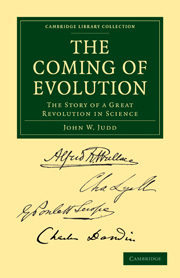Book contents
- Frontmatter
- Contents
- CHAP. I Introductory
- CHAP. II Origin of the Idea of Evolution
- CHAP. III The Development of the Idea of Evolution to the Inorganic World
- CHAP. IV The Triumph of Catastrophism over Evolution
- CHAP. V The Revolt Scrope and Lyell against Catastrophism
- CHAP. VI The Principles of Geology
- CHAP. VII The Influence of Lyell's Works
- CHAP. VIII Early Attempts to establish the Doctrine of Evolution for the Organic World
- CHAP. IX Darwin and Wallace: The Theory of Natural Selection
- CHAP. X The Origin of Species
- CHAP. XI The Influence of Drawin's Works
- CHAP. XII The Place of Lyell and Darwin in History
- Notes
- Index
- Plate section
CHAP. II - Origin of the Idea of Evolution
Published online by Cambridge University Press: 07 September 2010
- Frontmatter
- Contents
- CHAP. I Introductory
- CHAP. II Origin of the Idea of Evolution
- CHAP. III The Development of the Idea of Evolution to the Inorganic World
- CHAP. IV The Triumph of Catastrophism over Evolution
- CHAP. V The Revolt Scrope and Lyell against Catastrophism
- CHAP. VI The Principles of Geology
- CHAP. VII The Influence of Lyell's Works
- CHAP. VIII Early Attempts to establish the Doctrine of Evolution for the Organic World
- CHAP. IX Darwin and Wallace: The Theory of Natural Selection
- CHAP. X The Origin of Species
- CHAP. XI The Influence of Drawin's Works
- CHAP. XII The Place of Lyell and Darwin in History
- Notes
- Index
- Plate section
Summary
In all ages, and in all parts of the world, we find that primitive man has delighted in speculating on the birth of the world in which he lives, on the origin of the living things that surround him, and especially on the beginnings of the race of beings to which he himself belongs. In a recent very interesting essay, the author of The Golden Bough has collected, from the records of tradition, history and travel, a valuable mass of evidence concerning the legends which have grown out of these speculations. Myths of this kind would appear to fall into two categories, each of which may not improbably be associated with the different pursuits followed by the uncivilised races of mankind.
Tillers of the soil, impressed as they must have been by the great annual miracle of the outburst of vegetable life as spring returns, naturally adopted one of these lines of speculation. From the dead, bare ground they witnessed the upspringing of all the wondrous beauty of the plant-world, and, in their ignorance of the chemistry of vegetable life, they imagined that the herbs, shrubs and trees are all alike built up out of the materials contained in the soil from which they grow. The recognition of the fact that animals feed on plants, or on one another, led to the obvious conclusion that the ultimate materials of animal, as well as of vegetable, structures were to be sought for in the soil.
- Type
- Chapter
- Information
- The Coming of EvolutionThe Story of a Great Revolution in Science, pp. 5 - 13Publisher: Cambridge University PressPrint publication year: 2009First published in: 1910



